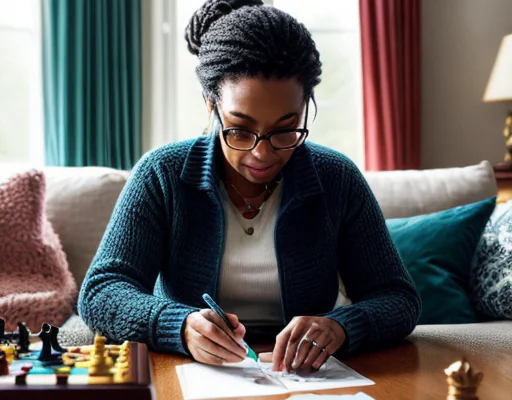
10 Puzzle Games for Family Brain Training
10 Puzzle Games for Family Brain Training
Puzzle games are a fantastic way to stimulate brain activity and have fun as a family. Whether you’re looking for games to play during a family game night or want to incorporate educational activities into your child’s routine, puzzle games provide a perfect solution. In this article, we will explore ten puzzle games that are not only entertaining but also great for family brain training.
The Benefits of Puzzle Games for the Family
Playing puzzle games offers numerous benefits for the entire family:
1. Cognitive Development
Puzzle games stimulate critical thinking, problem-solving, and logic skills, promoting cognitive development in both children and adults. By engaging in puzzles, family members can enhance their spatial awareness, memory, and reasoning abilities.
2. Bonding and Communication
Playing puzzle games together helps strengthen the bond between family members. Successful completion of puzzles requires teamwork, effective communication, and collaboration, fostering positive family dynamics and creating lasting memories.
3. Stress Relief
Puzzle games provide a healthy escape from daily stressors. As the mind focuses on solving puzzles, it distracts from worries and promotes relaxation, making them ideal for unwinding and connecting as a family.
Ten Puzzle Games for Family Brain Training
1. Jigsaw Puzzles
Jigsaw puzzles are a classic choice for family brain training. With various difficulty levels and themes available, they provide a versatile option for all ages. Completing jigsaw puzzles promotes fine motor skills, pattern recognition, and visual-spatial awareness.
2. Sudoku
Sudoku is a number puzzle game that challenges logical reasoning and problem-solving skills. It requires filling a grid with numbers according to specific rules. Sudoku puzzles come in different sizes and difficulty levels, offering endless brain-teasing opportunities for the whole family.
3. Crossword Puzzles
Crossword puzzles are perfect for expanding vocabulary and enhancing word association skills. Gather as a family and test your knowledge while having fun. Different crossword puzzle books cater to different age groups, ensuring everyone can participate.
4. Rubik’s Cube
The iconic Rubik’s Cube is a challenging puzzle game that tests spatial awareness, problem-solving, and patience. Working together as a family to solve the Rubik’s Cube can be a rewarding and fulfilling experience, offering a sense of achievement once the cube is solved.
5. Tangrams
Tangrams consist of various shapes that can be rearranged to create specific images or patterns. This ancient Chinese puzzle game enhances spatial reasoning, geometric problem-solving, and creativity. Tangram sets often include puzzles of different difficulties to accommodate a wide range of skill levels.
6. Brain Teasers
Brain teasers, such as riddles and logic puzzles, challenge critical thinking skills. They engage the mind in thinking outside the box and finding creative solutions. Brain teasers can be found in puzzle books, online resources, or even mobile apps, offering an endless supply of mind-stimulating challenges for the whole family.
7. Chess
Chess is a strategic board game that promotes critical thinking, problem-solving, and foresight. Playing chess as a family can enhance cognitive abilities, logical reasoning, and decision-making skills. Chess sets come in various sizes and styles, making it an enjoyable game for all ages.
8. Word Search
Word search puzzles are entertaining and beneficial for improving vocabulary and word recognition skills. With themes ranging from animals to historical events, word search puzzles offer educational content while keeping the whole family entertained.
9. Logic Games
Logic games, such as Mastermind and deductive puzzles, challenge analytical thinking and problem-solving. These games often require players to make deductions based on given clues and eliminate possibilities until the solution is found. Logical reasoning skills developed through these games can be valuable in many aspects of life.
10. Memory Games
Memory games, like concentration or matching games, focus on improving memory and concentration skills. They require players to remember the location of cards or objects and match them accordingly. These engaging games are not only fun but also help enhance cognitive abilities.
Incorporating Puzzle Games into Family Time
Introducing puzzle games into your family routine can be a delightful and educational experience. Here are some tips to make the most of family brain training:
1. Set Dedicated Time
Designate specific time slots for puzzle games, ensuring that everyone can participate and engage without distractions.
2. Create a Puzzle Area
Designate a specific area in your home for puzzle games. Having a dedicated space will make it easier to store puzzles and provide a comfortable environment for family brain training.
3. Choose Age-Appropriate Puzzles
Consider the age and skill levels of family members when selecting puzzle games. Choose puzzles that offer a suitable level of challenge for everyone involved.
4. Rotate Roles
Encourage family members to take turns in leading puzzle-solving efforts. This allows everyone to contribute and develop their problem-solving skills.
5. Celebrate Achievements
When the family successfully completes a puzzle, celebrate the achievement together. Acknowledge everyone’s effort and enjoy the sense of accomplishment.
6. Organize Puzzle Game Nights
Set aside a specific night each week for puzzle game nights. It can become a tradition that the whole family looks forward to, providing regular brain-training sessions and quality bonding time.
Conclusion
Puzzle games offer a world of brain-training opportunities for the entire family. From stimulating cognitive development to fostering communication and teamwork, these games provide a fun and educational way to engage with loved ones. By incorporating puzzle games into your family routine, you can create lasting memories while enhancing critical thinking and problem-solving skills.

